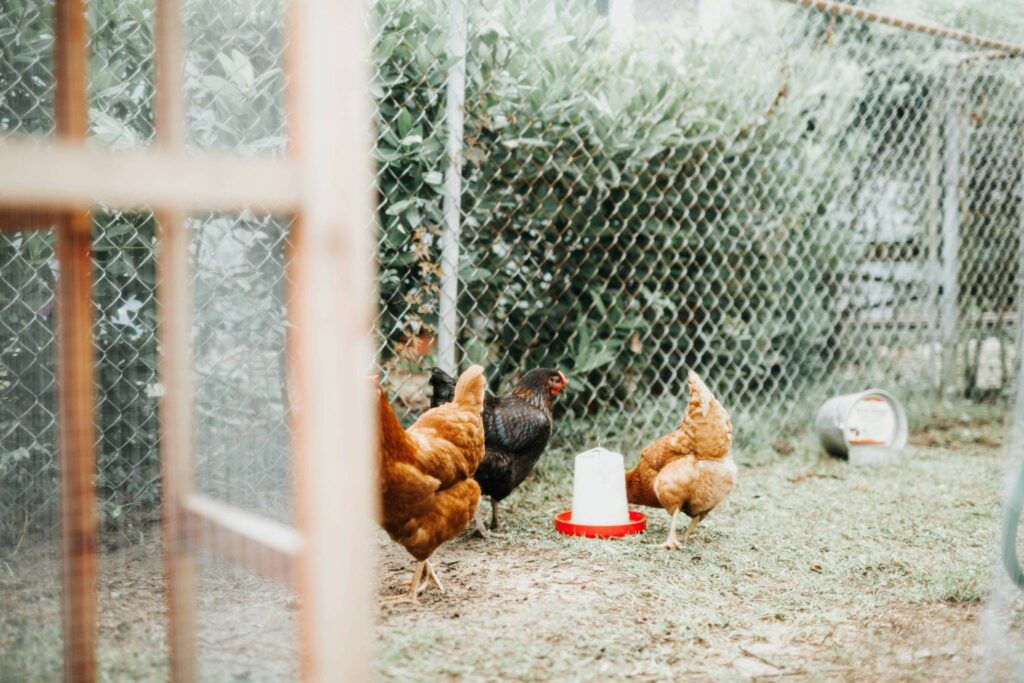Biosecurity is a set of preventative measures designed to protect poultry from infectious diseases, parasites, and other health threats. Whether you’re raising backyard chickens or managing a commercial poultry farm, biosecurity is essential for keeping your flock healthy and preventing the spread of harmful pathogens, such as avian influenza and Newcastle disease.

Why Is Biosecurity Important?
Poultry diseases can spread rapidly, leading to severe illness, loss of birds, and even economic consequences for farmers and poultry keepers. Some diseases can also affect humans (zoonotic diseases), making it even more critical to practice good biosecurity. Implementing strong biosecurity measures helps:
- Prevent disease outbreaks
- Protect poultry health and productivity
- Reduce the need for antibiotics and medical treatments
- Safeguard the food supply
- Limit economic losses
Key Biosecurity Practices for Poultry Keepers
Biosecurity involves a combination of physical barriers, hygiene practices, and careful monitoring. Here are the core elements of effective poultry biosecurity:
1. Keep Your Flock Isolated
Minimizing contact between your birds and potential sources of disease is the first line of defense.
- Avoid introducing new birds without proper quarantine (at least 30 days).
- Keep poultry enclosures secure to prevent contact with wild birds and rodents.
- Restrict visitors, especially those who have been in contact with other birds.
2. Maintain Strict Sanitation
Proper hygiene is essential in preventing disease transmission.
- Clean and disinfect coops, feeders, and waterers regularly.
- Wash hands before and after handling birds.
- Change clothes and boots before entering poultry areas, or use dedicated poultry-specific footwear.
- Disinfect tools and equipment that move between different flocks.
4. Secure a Safe Water and Feed Supply
Contaminated feed and water can introduce harmful pathogens.
- Use clean, fresh water sources.
- Purchase feed from reputable suppliers.
- Store feed in dry, rodent-proof containers to prevent spoilage and contamination.
3. Control Rodents and Wild Birds
Rodents and wild birds can carry and spread diseases to poultry.
- Store feed in sealed containers to prevent contamination.
- Use wire mesh to keep wild birds out of coops and enclosures.
- Eliminate standing water and spilled feed that attract pests.
5. Control Movement of People and Equipment
Limiting the movement of people, vehicles, and tools between poultry areas helps reduce the risk of disease introduction.
- Avoid sharing equipment with other poultry keepers unless properly disinfected.
- Provide footbaths at the entrance of coops to disinfect shoes.
- Require farm visitors to follow hygiene protocols, such as wearing clean protective clothing.
6. Monitor Flock Health Regularly
Early detection of disease can prevent the spread to the rest of your flock.
- Observe birds daily for signs of illness, such as lethargy, respiratory distress, diarrhea, or changes in egg production.
- Separate sick birds immediately and seek veterinary advice.
- Keep records of illnesses, treatments, and mortality rates.
Responding to a Disease Outbreak
Even with the best biosecurity practices, disease outbreaks can still occur. If you suspect a problem:
- Isolate affected birds immediately.
- Contact a veterinarian or local agricultural authority for guidance.
- Follow quarantine and sanitation protocols to prevent further spread.
- Properly dispose of dead birds according to local regulations.
In Conclusion
Biosecurity is an ongoing commitment that requires diligence and consistency. By taking proactive steps to protect your flock, you not only ensure their health and well-being but also contribute to the larger effort of preventing poultry disease outbreaks that can impact entire regions. Whether you’re a backyard poultry keeper or a large-scale farmer, practicing good biosecurity is one of the most effective ways to maintain a thriving, disease-free flock.
